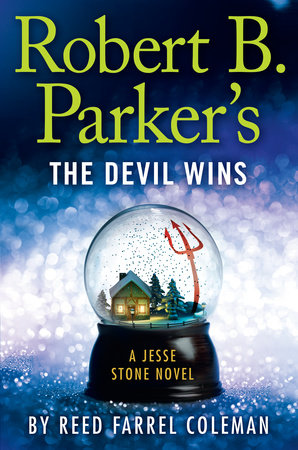 THE DEVIL WINS is the second installment since Reed Coleman took over writing the Jesse Stone series. This story involves Paradise Police Chief Jesse Stone having to solve both a cold case and a fresh case. Three corpses are discovered, a man wrapped in a tarp along with the skeletal remains of two teenage girls. After being examined the girls are identified as Mary Kate O’Hara and Virginia Connolly, two 16-year-olds who vanished about 25 years earlier during a Fourth of July celebration, the best friends of officer Molly Crane.
THE DEVIL WINS is the second installment since Reed Coleman took over writing the Jesse Stone series. This story involves Paradise Police Chief Jesse Stone having to solve both a cold case and a fresh case. Three corpses are discovered, a man wrapped in a tarp along with the skeletal remains of two teenage girls. After being examined the girls are identified as Mary Kate O’Hara and Virginia Connolly, two 16-year-olds who vanished about 25 years earlier during a Fourth of July celebration, the best friends of officer Molly Crane.
Elise Cooper: How would you describe Jesse Stone?
Reed Coleman: All Jesse Stone books to some extent are about regret and struggling. He is really a hands on guy who women adore. He is a tough guy, very athletic, one of the top former homicidal cops in Los Angeles, and currently the police chief of a beautiful New England town. Since there is not much fault to these attributes he has to have something the average person can relate with, which is his struggles with alcohol and his regret of being injured causing him to not have a professional baseball career.
EC: Besides focusing on Jesses’ regrets does the book also delve into Molly Cranes’ regrets?
RC: In some way this is a book about Molly. Her regrets are about her past boyfriends, wanting to be a big city cop, and her desire to be a patrol officer. She and Jesse are the central figures. In this book we see some of her personality other than the wise cracking person to Jesse. What I am doing with the series is writing the story of the supporting characters. There were about twelve books about Jesse and the supporting characters played minor roles. But all the characters are so rich I think there is an opportunity to write their stories. That is the genius of Robert Parker, he left space to explore these characters and the town of Paradise.
EC: Is he more like Wyatt Earp or Matt Dillon?
RC: Bob Parker always thought of his characters in a western sort of way. I think the reality is Jesse is somewhere between both. He believes in following the evidence and doing what is right, like Dillon. But in doing so he sometimes crosses the line. For example in BLINDSPOT Jesse intercedes on behalf of the waitress who is being beaten up by her boyfriend. He destroys his motorcycle to pick a fight. Just as with Wyatt Earp Jesse is willing to bend the rules.
EC: You wrote that police work is based on teamwork. Please Explain.

EC: Do you ever have a wish list about your plots and characters?
RC: A fantasy of mine is to have Jesse Stone working with Harry Bosch. I would love in a future book for Jesse to go back to Los Angeles where he used to work as a detective to help solve an old case. Also, Ace Atkins and I have often talked about writing a book together with Spenser and Jesse.
EC: Since all Jesse Stone books involve baseball in some way, are you a fan?
RC: I am a huge baseball fan. My team is the Mets. I live in the moment of every game, especially since I have followed this team since 1962. I agonize when they don’t do well and enjoy when they win. Of course Jesse’s team is the Los Angeles Dodgers. In this book I put in the line about Jesse pounding his glove, showing it is a way he is able to think through problems.
EC: In the book you point out the relationship between the police and the press. Please explain.
RC: All cops have very torn feelings about the press. Many see them as a hindrance. The author Hank Phillippi Ryan is a good friend of mine. Her main character is an investigative reporter in Boston and I always like to tweak her about the cops hating the press. Cops also do what Jesse did, which is provide misinformation to the press to help move the investigation forward.
THANK YOU!!





